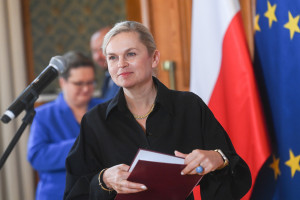Testing is completely free. 390,000 people aged 20 and over already have appointments.

Authors: PAP ; Prepared by BARB • Source: PAP • Published: July 9, 2025 15:21 • Updated: July 9, 2025 15:57
Over 500,000 Poles picked up a smartphone or visited a clinic and completed a survey as part of the "My Health" preventive program. The latest data was provided by the e-Health Center. Clinics contacted nearly 390,000 people to schedule tests.
- 390,000 Poles received appointments for tests under the "My Health" program
- Anyone over 20 years of age can participate.
- In this article you can find detailed information about the research
The "My Health" program launched on May 5th. Starting that day , patients 20 years of age and older can complete a questionnaire, which serves as the basis for issuing orders for diagnostic tests . After completing the tests, patients will meet with a doctor or nurse who will analyze the results. Patients will receive an individual health plan .
Until July 7:
- patients completed 502,000 surveys,
- 70 percent of the surveys were submitted by women,
- 30 percent - men,
- 57% of the surveys were submitted by people aged 20-39.
"My Health." Comprehensive information about the program- Nearly 380,000 patients were contacted by primary care clinics to schedule diagnostic tests, according to CeZ data.
The "My Health" preventive screening is available at every primary healthcare facility . Patients can complete a health assessment at the clinic where they are registered.
At the beginning:
- doctor,
- nurse,
- midwife, or
- prevention
conducts a survey with the patient (health assessment questionnaire).
IMPORTANT! You can also complete it yourself via the Online Patient Account (IKP).
It is intended to be an in-depth interview about lifestyle, risk factors for cardiovascular diseases, oncological diseases, taking into account family history, mental health, education and living environment.
Once approved, the questionnaire is the basis for generating a research order:
- blood count,
- blood glucose levels,
- blood creatinine level with estimated eGFR value (renal parameter),
- lipid profile including total cholesterol,
- LDL,
- HDL,
- non-HDL cholesterol and triglycerides,
- thyroid stimulating hormone (TSH - detects thyroid dysfunction),
- general urine examination.
Advanced diagnostic tests are ordered depending on age and survey results. These may include:
- alanine aminotransferase (ALAT),
- aspartate aminotransferase (ASPAT),
- gamma glutamyl transpeptidase (GGTP) - these are liver tests,
- Total PSA (an indicator of prostate enlargement) in men over 50 years of age,
- anti-HCV (hepatitis C virus),
- lipoprotein A - performed as part of a once-in-a-lifetime assessment between the ages of 20 and 40 (assessment of the risk of developing cardiovascular diseases).
The summary visit will take place in the office:
- doctor,
- nurses,
- midwife.
The patient will have the following measured:
- blood pressure,
- pulse,
- weight,
- growth,
- waist circumference,
- hip circumference,
- calculated BMI (weight for height),
- calculated WHR (waist to hip circumference).
During the follow-up visit, "global cardiovascular risk" will be assessed. Individuals aged 60 and over will have the opportunity to have their cognitive function assessed (using the mini-COG scale, which allows for decisions about further diagnostic testing for dementia) .
The patient will receive an analysis of their laboratory test results and survey results, as well as an Individual Health Plan (IHP). It will include:
- information about risk factors that were identified during the balance sheet,
- recommendations for a healthy lifestyle.
The patient will also receive an individual calendar of recommended vaccinations and a list of recommended health interventions, e.g. educational advice, and in the case of patients over 50 years of age - a fecal occult blood test (FIT-OC).
"My Health." Who can get a referral for free tests?People aged 20 to 49 can undergo tests under the new "My Health" balance no more than once every 5 years, and people over 49 no more than every 3 years.
Health Minister Izabela Leszczyna emphasized in May that the frequency: three and five years refers to a comprehensive health check-up, and the primary care physician will decide which tests and how often the patient should repeat them.
- If the results indicate that we should repeat the tests in a year, this is agreed with the doctor - she added.
The balance does not exclude what primary health care and other health programs offer on a daily basis .
A health check can be done at least 12 months after the last examination under the "Prevention 40 Plus" program (which ended on April 30).
The "My Health" adult balance sheet aims to improve early detection of:
- cardiovascular diseases and diabetes,
- kidney diseases,
- thyroid dysfunction,
- selected oncological diseases,
- selected infectious diseases (HCV - hepatitis C virus),
- mental and cognitive disorders.
The goal is also to increase the percentage of people vaccinated (vaccination recommended).
Copyrighted material - reprint rules are specified in the regulations .
rynekzdrowia













